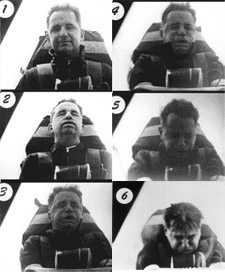J.P. Stapp: ‘fastest man on Earth’ — and quotable alum
 I’m a sucker for strange stories, but stay with me on this one…
I’m a sucker for strange stories, but stay with me on this one…
I stumbled across this story just the other day, about “the fastest man on Earth,” John Paul Stapp — who just happens to be a Baylor grad (BA ’31, MA ’32). In the 1940s and ’50s, Stapp was an Air Force colonel working at a research facility studying the effects of rapid deceleration, testing both the strength of seats and harnesses and the human tolerance to the G forces encountered in simulated plane crashes. Unwilling to risk injury to any of his own men, Stapp repeatedly served as his own test dummy over a period of several years (like in the test pictured at right).
In 1955, Stapp was featured on the cover of Time magazine after he (and the rocket he rode) broke the land speed record. Later in life, he used his research to emphasize the need for seatbelts in cars; when President Lyndon Johnson signed the legislation in 1966 that made seatbelts mandatory, Stapp was in the room.
All of that would be enough for most men, and it was indeed enough of a career that the Baylor Alumni Association included a profile of Stapp in its ongoing “Alumni 150” series in the Baylor Line. But it’s an almost completely unrelated happenstance that makes Stapp — and Baylor by connection — the answer to a trivia question: “Who coined the term ‘Murphy’s Law‘?”
The exact evolution of the phrase is murky, but most signs point to Stapp as the person who first used the term. (This long feature is an excellent read, and details both Stapp’s experiments and how the term came to be.) A captain by the name of Ed Murphy had come to check out Stapp’s experiments. Something went wrong, and Murphy commented on the occurrence. Later at a press conference, Stapp reportedly mentioned that “we do all of our work in consideration of Murphy’s Law.” When questioned, Stapp explained that it was the idea that you had to think through all possibilities before doing a test so as to avoid disaster.
In the years since then, the term has become quite commonplace — even earning a spot in Webster’s Dictionary. All thanks to a Baylor Bear!
Sic ’em, Colonel Stapp – for your life-saving research, and your way with words!

